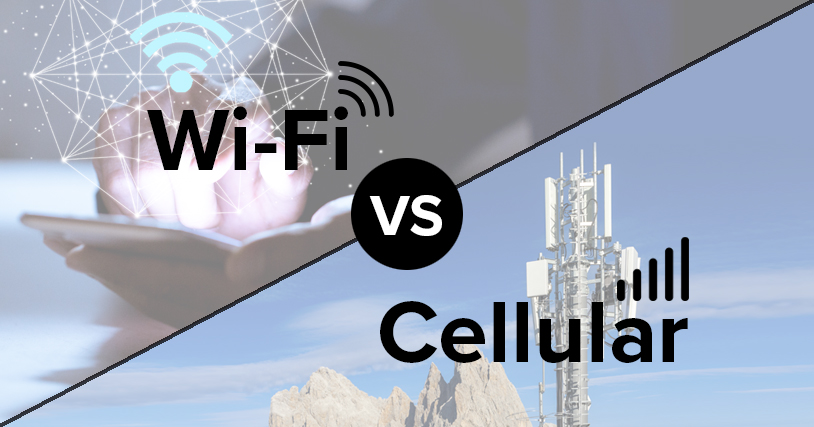Elevate Your Enterprise Connectivity: 4G/5G Cellular vs. Wi-Fi

Reliable and high-performance connectivity is no longer a luxury—it’s a necessity. As businesses embrace digital transformation and increasingly rely on data-driven operations, the choice of network infrastructure becomes critical. While Wi-Fi has served as the traditional workhorse for wireless connectivity, cellular technologies like 4G and 5G are emerging as powerful alternatives, offering a compelling array of business benefits. At Hughes, we’re helping enterprises leverage the power of managed private cellular networks to unlock new levels of efficiency, productivity, and innovation.
Beyond Wi-Fi Best Effort to Predictable Performance
One of the most significant advantages of 4G/5G cellular over Wi-Fi connectivity lies in its ability to deliver predictable performance. Wi-Fi operates on unlicensed spectrum, making it susceptible to interference and congestion from other neighboring Wi-Fi networks and devices. Wi-Fi struggles to support the high density of IoT devices, which are often required for enterprise automation and modernization. With fluctuating bandwidth, latency, and reliability, mission-critical applications may be affected.
Cellular technologies, on the other hand, are designed for consistent and reliable connectivity. Private cellular networks offer dedicated bandwidth and quality of service (QoS) capabilities, ensuring that critical applications receive the necessary resources, even in demanding environments. This is essential for supporting real-time applications, like autonomous mobile robots (AMRs) in manufacturing or high-definition video streaming for remote operations.
Seamless Mobility and Wider Coverage
Wi-Fi’s limited range and susceptibility to handoff issues can hinder mobility within large facilities. As devices move between Wi-Fi access points, they often experience drops in connectivity or increased latency.
Cellular networks excel in providing seamless mobility. They are designed to support devices moving across wide areas, ensuring continuous connectivity and smooth handoffs. This makes them ideal for applications that require constant connectivity for moving assets, such as in warehouses, distribution centers, and logistics operations. Furthermore, cellular networks can cover vast areas, both indoors and outdoors, eliminating the need for multiple, overlapping Wi-Fi networks.
Enhanced Security: Protecting Your Critical Data
Security is paramount for any enterprise, and cellular technologies offer significant advantages over Wi-Fi. Wi-Fi networks are often vulnerable to security breaches due to their reliance on shared passwords and less robust encryption protocols.
Cellular networks’ SIM-based authentication does not rely on passwords , providing a more secure environment for transmitting sensitive data. Private cellular networks offer an even higher level of security by isolating network traffic from the public internet, reducing the risk of cyberattacks and data breaches.
| Feature Performance | Cellular (4G/5G) | Wi-Fi |
| Reliability | Predictable, consistent performance; dedicated bandwidth; QoS capabilities | Susceptible to interference and congestion; fluctuating bandwidth and latency |
| Latency | Low latency, especially with 5G, enabling real-time applications | Higher and more variable latency |
| Mobility | Seamless handovers; continuous connectivity across wide areas | Limited range; handoff issues can cause drops in connectivity |
| Coverage | Wide area coverage, both indoors and outdoors | Limited range; requires multiple access points for large areas |
| Security | Strong authentication and encryption; private networks offer isolation from public internet | Vulnerable to security breaches; relies on shared passwords and less robust encryption |
| Applications Ideal for |
Mission-critical applications, automation, robotics, IoT, edge computing, mobile operations | General internet access, office productivity |
Unlocking Industry 4.0 and Digital Transformation
The benefits of 4G/5G cellular extend beyond just replacing Wi-Fi. These technologies are powerful enablers of Industry 4.0 and digital transformation initiatives.
- Automation: Cellular connectivity provides the reliable and low-latency communication needed to control and coordinate automated systems, robots, and machinery.
- IoT Connectivity: Cellular networks can connect a massive number of IoT devices, enabling real-time monitoring, data collection, and analysis.
- Edge Computing: Combining cellular with edge computing allows for processing data closer to the source, reducing latency and enabling real-time decision-making.
Hughes: Your Partner in Private Wireless Networks
At Hughes, we understand the unique connectivity challenges faced by modern enterprises. Our managed private wireless network solution, powered by Celona, provides a secure, reliable, and high-performance solution, seamlessly integrating private wireless technologies with your existing IT infrastructure. We offer end-to-end services, from design and deployment to ongoing management and support, allowing you to focus on your core business.
Contact Hughes today to learn how our managed private network solution can transform your business and unlock the full potential of your digital transformation.